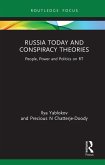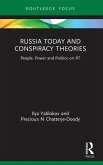This edited volume investigates for the first time the impact of conspiracy theories upon the understanding of Europe as a geopolitical entity as well as an imagined political and cultural space.
Focusing on recent developments, the individual chapters explore a range of conspiratorial positions related to Europe. In the current climate of fear and threat, new and old imaginaries of conspiracies such as Islamophobia and anti-Semitism have been mobilised. A dystopian or even apocalyptic image of Europe in terminal decline is evoked in Eastern European and particularly by Russian pro-Kremlin media, while the EU emerges as a screen upon which several narratives of conspiracy are projected trans-nationally, ranging from the Greek debt crisis to migration, Brexit and the COVID-19 pandemic. The methodological perspectives applied in this volume range from qualitative discourse and media analysis to quantitative social-psychological approaches, and there are a number of national and transnational case studies.
This book will be of great interest to students and researchers of extremism, conspiracy theories and European politics.
Focusing on recent developments, the individual chapters explore a range of conspiratorial positions related to Europe. In the current climate of fear and threat, new and old imaginaries of conspiracies such as Islamophobia and anti-Semitism have been mobilised. A dystopian or even apocalyptic image of Europe in terminal decline is evoked in Eastern European and particularly by Russian pro-Kremlin media, while the EU emerges as a screen upon which several narratives of conspiracy are projected trans-nationally, ranging from the Greek debt crisis to migration, Brexit and the COVID-19 pandemic. The methodological perspectives applied in this volume range from qualitative discourse and media analysis to quantitative social-psychological approaches, and there are a number of national and transnational case studies.
This book will be of great interest to students and researchers of extremism, conspiracy theories and European politics.
"The COVID-19 pandemic has made it abundantly clear that conspiracy theories are not, or no longer, a fringe phenomenon in European politics, in part because the political fringes have moved into the political mainstream. This highly original volume broadens the scope of European politics by analyzing key political conspiracy theories in contemporary Europe, which target individuals (Soros), groups (Muslims), and institutions (the European Union). It should be essential readings for scholars of Euroscepticism, far right politics, populism, and, frankly, European politics in general." - Cas Mudde, Stanley Wade Shelton UGAF Professor at the University of Georgia, USA
"In this volume, Andreas Önnerfors and André Krouwel have assembled an outstanding set of chapters from some of the leading experts on conspiracy theories. Together, these contributions provide a compelling analysis of how conspiracy theories have shaped, and are still shaping, Europe." - Karen Douglas, University of Kent, UK
"Conspiracy theories have become increasingly prominent in European politics, often with deleterious consequences. Yet we have amassed few answers to explain why. In this powerful volume, Önnerfors and Krouwel assemble the prominent experts to tackle the causes and consequences of these troubling trends in Europe. I strongly recommend this volume to anyone interested in conspiracy theories." - Joseph Uscinski, University of Miami, USA
"With the rise of misinformation and fake news, the timing of "Europe: Continent of Conspiracies" could not be better. By using a breadth of data, this book provides a chilling insight into the existence, spread and consequences of conspiracy theories in European politics. It is a must read for anyone interested in understanding the contours of political change in Europe and the role of the COVID-19 pandemic in this process." - Catherine E. de Vries, Bocconi University, Italy
"Conspiracy theories have burrowed back into the mainstream, no thanks to QAnon's evil; redoubled by a pandemic showing no sign of abating in 2020. Yet these new variations fit into well-worn grooves of conspiracist thinking in contemporary Europe from radical right and left, some of it distinctly genocidal. Drawing together case studies from more than a dozen European countries, expert guides Andreas Önnerfors and Andreì Krouwel provide a nuanced understanding of this hydra-headed phenomena that, sadly, retains its power to seduce activists - and, indeed, to shock readers." - Matthew Feldman, Director of the Centre for Analysis of the Radical Right
"In this volume, Andreas Önnerfors and André Krouwel have assembled an outstanding set of chapters from some of the leading experts on conspiracy theories. Together, these contributions provide a compelling analysis of how conspiracy theories have shaped, and are still shaping, Europe." - Karen Douglas, University of Kent, UK
"Conspiracy theories have become increasingly prominent in European politics, often with deleterious consequences. Yet we have amassed few answers to explain why. In this powerful volume, Önnerfors and Krouwel assemble the prominent experts to tackle the causes and consequences of these troubling trends in Europe. I strongly recommend this volume to anyone interested in conspiracy theories." - Joseph Uscinski, University of Miami, USA
"With the rise of misinformation and fake news, the timing of "Europe: Continent of Conspiracies" could not be better. By using a breadth of data, this book provides a chilling insight into the existence, spread and consequences of conspiracy theories in European politics. It is a must read for anyone interested in understanding the contours of political change in Europe and the role of the COVID-19 pandemic in this process." - Catherine E. de Vries, Bocconi University, Italy
"Conspiracy theories have burrowed back into the mainstream, no thanks to QAnon's evil; redoubled by a pandemic showing no sign of abating in 2020. Yet these new variations fit into well-worn grooves of conspiracist thinking in contemporary Europe from radical right and left, some of it distinctly genocidal. Drawing together case studies from more than a dozen European countries, expert guides Andreas Önnerfors and Andreì Krouwel provide a nuanced understanding of this hydra-headed phenomena that, sadly, retains its power to seduce activists - and, indeed, to shock readers." - Matthew Feldman, Director of the Centre for Analysis of the Radical Right








